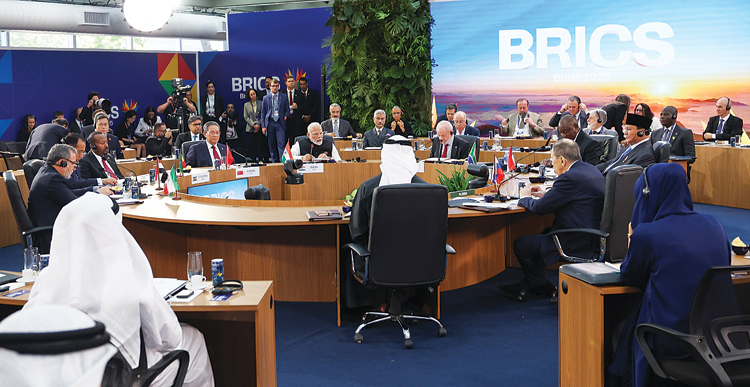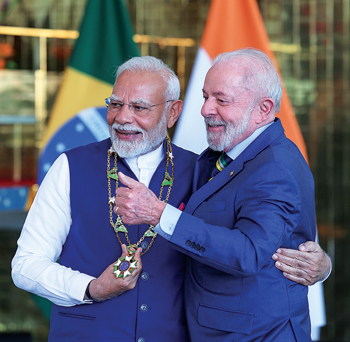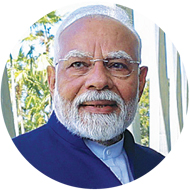INDIAN ARMED FORCES CHIEFS ON OUR RELENTLESS AND FOCUSED PUBLISHING EFFORTS

The insightful articles, inspiring narrations and analytical perspectives presented by the Editorial Team, establish an alluring connect with the reader. My compliments and best wishes to SP Guide Publications.

"Over the past 60 years, the growth of SP Guide Publications has mirrored the rising stature of Indian Navy. Its well-researched and informative magazines on Defence and Aerospace sector have served to shape an educated opinion of our military personnel, policy makers and the public alike. I wish SP's Publication team continued success, fair winds and following seas in all future endeavour!"

Since, its inception in 1964, SP Guide Publications has consistently demonstrated commitment to high-quality journalism in the aerospace and defence sectors, earning a well-deserved reputation as Asia's largest media house in this domain. I wish SP Guide Publications continued success in its pursuit of excellence.
- A leap in Indian aviation: Prime Minister Modi inaugurates Safran's Global MRO Hub in Hyderabad, Calls It a Milestone
- All about HAMMER Smart Precision Guided Weapon in India — “BEL-Safran Collaboration”
- India, Germany deepen defence ties as High Defence Committee charts ambitious plan
- True strategic autonomy will come only when our code is as indigenous as our hardware: Rajnath Singh
- EXCLUSIVE: Manish Kumar Jha speaks with Air Marshal Ashutosh Dixit, Chief of Integrated Defence Staff (CISC) at Headquarters, Integrated Defence Staff (IDS)
- Experts Speak: G20 Summit: A Sign of Global Fracture
Shaping of BRICS: An Emerging Alternative Global Reality
Despite the challenges and lack of consensus on some issues, the BRICS 2025 Summit in Brazil, with the Rio de Janeiro Declaration, concluded with greater strength and resolve—it is here to stay

The BRICS grouping—originally comprising Brazil, Russia, India, China, and South Africa—has evolved from a loose economic bloc into a geopolitical force with far-reaching ambitions. With its expansion to 11 members, including countries like Egypt, Ethiopia, Iran, Indonesia, Saudi Arabia, and the UAE, BRICS is no longer a niche coalition of emerging markets but a formidable consortium representing over 40 per cent of the global population and a rising share of global GDP.
At its core, this expanded alliance signals an emerging alternative to the Western-dominated world order and articulates a long-overdue demand: fairer representation for the developing world. The BRICS summit in Rio de Janeiro signifies the bloc’s continued efforts to strengthen cooperation among emerging economies.
At the same time, BRICS countries have diverse geopolitical interests and have faced regional conflicts and disputes, which hinder cooperation.
RAISING DEMOCRATIC AND INCLUSIVE GLOBAL GOVERNANCE
There is no denying that institutions that govern the global economy, particularly the United Nations Security Council (UNSC), the International Monetary Fund (IMF), and the World Bank still playing the dominant role; their failure on multiple fronts and Western institutional approach are equally visible.
The developing world, despite being home to the majority of humanity, remains under represented. Africa, for instance, has no permanent seat at the UNSC, and voting power at the Bretton Woods institutions is still heavily skewed in favour of the United States and its allies.

BRICS has consistently called for reforms to these institutions. The demand is not for dismantlement but for democratisation. A more representative Security Council would better reflect contemporary geopolitical realities, where power and influence are far more distributed. Similarly, rebalancing voting rights within the IMF and the World Bank would make these institutions more responsive to the development needs and policy preferences of the Global South.
Moreover, as India takes over the leadership from Brazil next year, it hints at building a ‘new form’. Prime Minister Narendra Modi announced such intention at the grouping’s summit in Rio De Janeiro on July 7. India is also infusing technology into the BRICS deliberation, driving initiatives in AI, digital infrastructure, and cybersecurity within BRICS. Tech and security in the BRICS mandate will certainly be more meaningful than a lot of plenary talks that become just a routine.
“The BRICS Summit was a splendid opportunity to elaborate on issues impacting the planet and the importance of the Global South in the global high table. I also spoke about different aspects relating to health, technology and climate change.”
—Narendra Modi, Prime Minister of India
“Under India’s BRICS presidency, we will work to define BRICS in a new form. BRICS will mean Building Resilience and Innovation for Cooperation and Sustainability. Just as during our G-20 chairmanship....” he said.
MULTILATERALISM, NOT HEGEMONY
Contrary to portrayals of BRICS as a rival bloc to the West, the group has positioned itself as a defender of multilateralism. BRICS countries reaffirmed their commitment to multilateralism and defending international law, including the UN Charter.

It seeks a multipolar world—one where decision-making is not monopolised by a few but shared by many. BRICS’ repeated calls for adherence to international law, the centrality of the United Nations, and commitment to peaceful dispute resolution are rooted in this multilateral vision.
Its endorsement of the Paris Agreement on climate change is another example of its consensus-based directive. As both victims of and contributors to climate change, BRICS nations have an interest in climate justice. BRICS pushes not only for action but for fairness—insisting that developed countries honour their commitments to climate finance and technology transfer.
TOWARDS A NEW FINANCIAL ARCHITECTURE
The BRICS bloc is not only proposing institutional reform but actively building alternatives. The New Development Bank (NDB), established in 2015, offers an alternative to the World Bank, financing infrastructure and sustainable development projects without the stringent policy prescriptions of Western lenders. The Contingent Reserve Arrangement is a buffer against financial instability, providing liquidity support in times of crisis. The BRICS Cross-Border Payments Initiative (BCBPI), while still progressing, is certainly demonstrating efforts towards financial cooperation and alternative financial systems.
BRICS is no longer a niche coalition of emerging markets but a formidable consortium representing over 40 per cent of the global population and a rising share of global GDP
The push for de-dollarisation—creating alternatives to the US dollar in international trade—is gaining traction within BRICS. This is not an ideological crusade but a practical response to the weaponisation of the dollar through sanctions and monetary policy that disproportionately affects non-Western economies. With discussions around a BRICS common currency still a work in progress, the group has encouraged the use of national currencies in trade settlements, is exploring ways to build a more resilient and less dollar-dependent global financial system. BRICS also highlighted advancing digital payment platforms like BRICS Bridge and BRICS PAY among the group.
However, challenges remain in building consensus on some initiatives, such as the proposed BRICS Credit Rating Agency (CrRA), which has not advanced due to a lack of consensus.
A PRACTICAL AGENDA
There are opinions that BRICS still lacks a coherent agenda to implement amid the factions being played out in geopolitics.
With its enlarged membership, BRICS is not symbolic—it is building some operational mechanism. Its agenda includes cooperation on energy, digital infrastructure, education, public health, and conflict resolution. The inclusion of major oil exporters and key regional powers adds strategic weight to its actions and raises the potential for genuine South-South cooperation.
Yet challenges remain. Internal divisions, geopolitical rivalries, and differing economic models can hinder consensus. But the group’s strength lies in its diversity—and in its shared vision of a more equitable global order.
The rise of BRICS is not a rejection of the global order but a reimagining of it. Its expanded membership and growing influence underscore a world in transition, where emerging powers are no longer willing to be passive rule-takers.
Despite all such insecurities, BRICS has positioned an alternative architecture—rooted in multipolarity, fairness, and sovereignty—that will rise to fill the void. And the world should take note.
Manish Kumar Jha is a Consulting & Contributing Editor for SP’s Aviation, SP’s Land Forces and SP’s Naval Forces and a security expert. He writes on national security, military technology, strategic affairs & policies.






